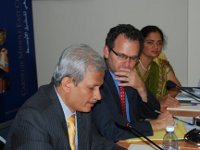Registration
You will receive an email confirming your registration.
India must find a way to bring prosperity to its own people living in the rural periphery, concluded Sundeep Waslekar, president of the Strategic Foresight Group, at a roundtable discussion organized by the Carnegie Middle East Center. Waslekar was joined by Pakistan’s Ambassador Raana Rahim and India’s Ambassador Ravi Thapar for a discussion on the challenges facing India and its external relations.
Prosperity Challenges
Finding a way to bring prosperity to the periphery is one of the biggest challenges facing modern India, Waslekar argued. The population of both the urban marketplace and the rural periphery will be expanding over the coming years, and breakthroughs in agriculture will be needed to help those in the Indian periphery transition into the market economy.
There are two important obstacles to bringing prosperity to the periphery, explained Waslekar:
- Water Scarcity: India must make dramatic progress in managing its limited water resources to enable sustained growth in the rural areas. Water scarcity is also going to have a major influence on international relations in South Asia and the Middle East.
- Technology: Waslekar argued that India will have a lot riding on its ability to lead in the ‘fourth industrial revolution’, which will be one focusing on breakthroughs in Genomics, Nanotechnology, and Robotics (GNR). Should India achieve such a breakthrough in GNR, it will emerge as a major world player in the next 15 years.
Economic Ties
Waslekar argued that economic ties are key in bringing governments closer to one another, citing Turkish and Indian relations as an example. He suggested that Turkey, the Levant countries, and Iraq should create a united economic community with which India could enter into an economic partnership.
Challenges facing the South Asian Association For Regional Cooperation (SAARC)
Waslekar argued that the SAARC region needs political stability, an effective social union, and economic cooperation. Pakistan’s Ambassador Rahim urged India to take a more serious political role in SAARC, while India’s Ambassador Thapar called for Pakistan to address its trade policies with India.
- Political Entity: Waslekar suggested that the SAARC is a political institution and not necessarily an economic one. Rahim disagreed, saying that the SAARC is not a political entity, because India has shied away from discussing politics with the SAARC. She urged India to play a more proactive political role and continue its dialogue with Pakistan.
- Diplomacy: Thapar stated that Pakistan will need to reconsider its restrictions on exports from India before speaking of economic cooperation in SAARC. India is open to dialogue, Thapar said, but is looking for proof of sincerity from the Pakistani side.
- Pakistan’s Future: Waslekar argued that Pakistan’s future will be determined by the battle between its own forces of progress and orthodoxy, and not outside intervention.
Indian Forces of Division
Riad Al-Khouri, former visiting scholar at the Carnegie Middle East Center, brought up the role of Hindu nationalism in Indian politics.
- Political Divide: Al-Khouri asked about the effect of religious chauvinism on the state, expressing concern that increasing religious intolerance could lead to a breakdown of Indian democracy.
- Economic Divide: Waslekar argued that India currently has over eight hundred million people living on the periphery, making the state's challenges mainly economic and not political. While he expressed a mild concern about the nationalist movements, Waslekar concluded by saying that the state is able to manage the threat of extremism and that the values of democracy, faith, and volunteerism are what maintain India's stability.
